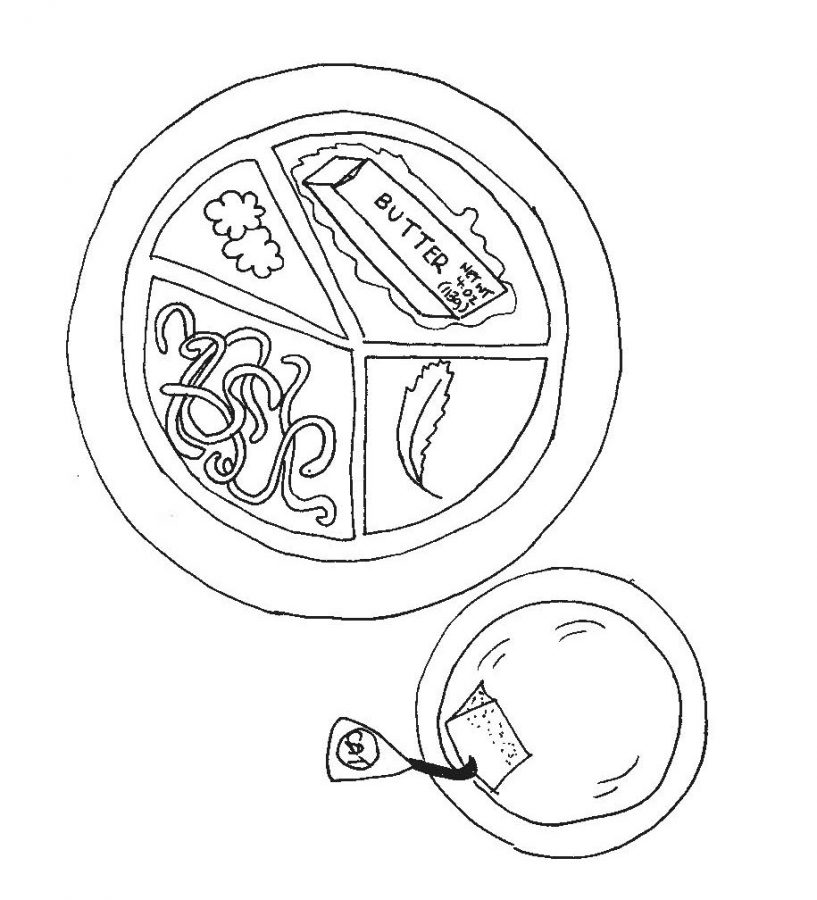Fad diets are bad diets
Dietitians say the risks of extreme eating habits vastly outweigh, outlast the benefits they offer
Graphic by Ellen Fox Inked by Bella Russo.
Fad diets can be especially harmful to teens who are more at risk when it comes to the mental, social and developmental harms that come with these diets.
August 23, 2019
Fad diets. We have all heard of them. Ranging in extremity from diets we may think are good for us, like the paleo diet (where you eat no processed foods) or the keto diet (an extreme, 90 percent fat diet) to appetite suppressants popularized by companies like Flat Tummy Co., to downright destructive fads like swallowing tapeworms or eating cotton balls. These diets can be harmful to any person who decides to go on them, but they can be especially damaging to teens because of the mental, social and developmental ties that come with them.
Let’s talk about the psychological effects of dieting as a teenager. At a time in life where hormones are still regulating and everything seems like a crisis, a lot of teens are looking for a way to alleviate the stress of insecurity. Social media repeatedly shows us the perfect body, whether it be a broad, chiseled man or a flat ab-ed, fat bottomed woman. The level of exposure we have to these images make it is easy for many teens to draw the conclusion that losing weight to achieve these “slim thick” bodies is the path to their happiness. Companies use this image to their advantage. They advertise their programs as ways for people to lose pounds fast to sell their programs, appetite suppressants or operations. The problem with trying to lose weight quickly is that it’s frustrating when you can’t achieve the most often-times unrealistic results, which puts dieters at risk of developing incredibly dangerous eating disorders in order to get results faster. To learn a more about this, I talked to registered dietitian Zoe Halbert.
“There are many risks involved when we choose to go on diets.” Halbert said. “Research has shown us that 25 percent of people who go on diets develop eating disorders, and only 5 percent of diets are actually successful in terms of weight loss over more than 2-5 years. Dieting also has been shown to lead to weight cycling (gaining and losing significant amounts of weight), which can lead to poor cardiac health and puts a lot of stress on the body.”
Halbert also confirmed that teens are more at risk than adults for developing eating disorders.
“Other outcomes of diets include a slowed metabolism, disconnection from body signals such as hunger/fullness, [and] binge eating,” Halbert said. “On a societal scale, diets also perpetuate weight stigma and fat phobia, which is harmful to everyone. Teens going on diets are often at higher risk of developing disordered eating and an unhealthy relationship with food.”
On the physical side of things, extreme dieting can also be dangerous to your health. As a full-fledged adult but especially as a developing teen, it is necessary that our bodies be given the proper nutrients and the correct amounts of them. I’ll go through my five dieting examples and explain why they are unhealthy options for the average person.
The paleo diet, also known as the caveman diet, is centered around eating like our ancestors. It cuts out all processed foods and focuses on vegetables, fruits and lean meats. It limits many carbohydrates like bread, sugar, grain, beans and potatoes. The ketogenic diet is based on eating a high-fat diet, almost 90 percent, and also cuts out carbohydrates.
“Carbohydrates should make up 50-60 percent of our diet, so that’s a huge portion of nutrition we need that is being cut out on both of these diets,” Halbert said. “When we don’t eat carbohydrates, weight loss can occur, but it’s only temporary as a diet without carbs is not sustainable long term. Research also shows that fasting from carbohydrates results in increased craving and binging on carbohydrates later on,” Halbert said. “Our bodies rely on carbs as our main source of energy; in fact, our brain only uses glucose (sugar) for energy, so without enough carbs we can have reduced memory and fatigue. A high fat/low carb diet can also increase our risk of heart disease long term.”
Limiting carbohydrates on its own can cause unwanted, unexpected changes in dieter’s bodies. These diets have proven to be harmful and not worth the hunger, frustration and non-permanent weight loss that they create. The keto diet was first developed as an alternative medical treatment.
“The keto diet was originally used for children with epilepsy to stop seizures temporarily,” Halbert said, “it was never meant to be used by the average person.”
The high-fat diet was later popularized as a pill on the show Shark Tank, which has since been exposed as a scam and designed to take advantage of people looking to lose weight. Taking into account that this diet was not even meant for healthy adults in the first place, the reasons start to stack up to stop dieting just because media says that it works.
The next fad trend that I personally have been seeing a lot of is appetite suppressants. Highly influential celebrities, notably the Kardashian/ Jenner sisters, have promoted the company Flat Tummy Co. On its website, the company says that its mission is to “create a range of products that were super easy, super healthy and designed to help our babes get back on track, and stay on track. We’re all about helping women look and feel like the best versions of themselves.” While a respectable and understandable cause, “appetite suppressant lollipops” that come in fun flavors marketed to generally younger women is just not the right way to go about it.
“Appetite suppressants are anything or any substance that interferes with our bodies natural hunger signals. Some examples would be drinking water to try a suppress appetite, coffee or medications/supplements. Its very acceptable in our culture to try and suppress our bodies’ natural hunger signals, but I was always ask my clients, ‘Would you ever try and suppress any other of your other body’s signals such as thirst or needing to use the restroom?’ The answer is usually no,” Halbert said. “The purpose of hunger is to tell us when we need more energy from food; ignoring hunger can actually lead to binging and the potential for our hunger signals to become dysregulated. Its recommended to eat constant meals and snacks throughout the day when we feel hunger to support our health.”
The final two diets I will discuss are what I group as “foreign object diets.” Swallowing cotton balls is one of these extreme diets. Dieters will soak a cotton ball in something sweet, such as a juice, and swallow it whole with the idea that they are filling but virtually zero calories. This diet has some obvious consequences on what we have already covered in the malnutrition zone, but introduces a new danger of having foreign objects in your system. The other “foreign object” diet is the tapeworm diet. This involves swallowing live tapeworms in hopes that they will, in a sense, eat your food for you. After you have lost the amount you want, you just go get a pill that kills the worms and over time you rid yourself of them through stool. This extreme diet can also be extremely dangerous. Tapeworms are parasites, and people can die from having them in their bodies. It is not a good idea to put them in your body on purpose just in the hopes of losing weight. Both of these “foreign object diets” can have some pretty steep consequences.
“Our bodies can’t break down foreign objects as they aren’t composed of basic macronutrients (carbs, protein, or fat,) minerals or vitamins. So when we ingest foreign objects they can block our intestinal pathway or even cause tears in our intestinal walls resulting in impaction and/or infection that could require surgery. They can also cause a great deal of abdominal pain and discomfort,” Halbert said.
Ingesting foreign objects can not only be extremely harmful but also expensive to remove. Stomach pumps, which are sometimes required, can be anywhere from $1,000 to $6,000, not including the cost of possible hospital stays.
It’s important to remember, especially as a teen, that dieting can get extreme. If you are someone looking to diet, Halbert recommends talking to a dietitian to meet your specific.
“Health is not just based on diet. Other factors include our social connections, sleep, socioeconomic status, mental health, movement, genetics, community, access to health care, etc.,” Halbert said. “Eating healthy is not just about what foods we eat; it’s being in touch with what our bodies are telling us and having a healthy mentality around food. A healthy diet overall is flexible, varied and balanced, and it will not look the same between two people because we all have unique needs.”
She also recommends using intuitive eating, a practice which you probably already use. It’s essentially listening to your body and your hunger levels, and eating when your body tells you that you need to eat.
“Our bodies actually give us a lot of guidance on what and how to eat: we just have listen and be in touch, which can take a little practice if we are not used to doing so,” she said.
If you are looking to diet, and are interested in seeing an expert, Halbert also cautions seeing people who market themselves as “nutritionists.”
“If anyone does have nutrition concerns or wants to develop a healthy relationship with food, I recommend visiting a dietitian. Be cautious with anyone titled as a nutritionist, as that is not a protected term, so anyone can be a nutritionist regardless of their knowledge or experience. Nutrition information that is available online or in popular diet books is often very conflicting and convoluted, so making sure you speak to a healthcare professional who is well-versed in scientific literature and well trained in their profession is important.”
Overall, a healthy relationship with food is all most people need. There is no necessity for creative and extreme diets, and it is more simple than that. Just listening to your body, and taking to heart a greater meaning of health- concerning all aspects, like mental health, social relationships and stress levels/emotional health.
Health really means finding the balance between all of the different aspects we all experience as humans, and extreme dieting can throw that balance off.





